Ladies We Love: Author + Ocean Conservationist Liz Cunningham
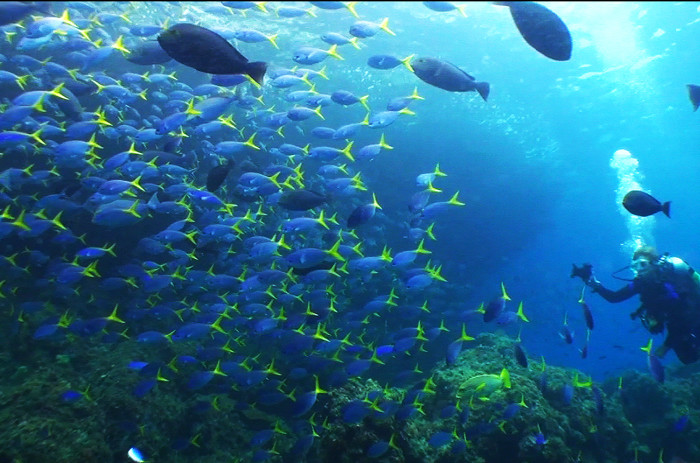
Years ago, veteran journalist Liz Cunningham was kayaking off the California coast when a rogue wave tackled her kayak and nearly drowned her. The accident mauled her body, causing terrible and enduring pain, but it also offered a gift: a motivation to follow her true calling.
In her new book, Ocean Country: One Woman’s Voyage from Peril to Hope in Her Quest To Save the Seas, Cunningham weaves vivid tales of crisscrossing the world, meeting people on the front lines of ocean conservation, from Spanish fishermen to California biologists. Along the way, she finds her own true purpose and an unexpected sense of hope in the face of the biggest challenges humankind has ever faced.
WomensMovement.com caught up with the peripatetic scribe for her wisdom on how to follow your passion and take wise action to support conservation and battle climate change.
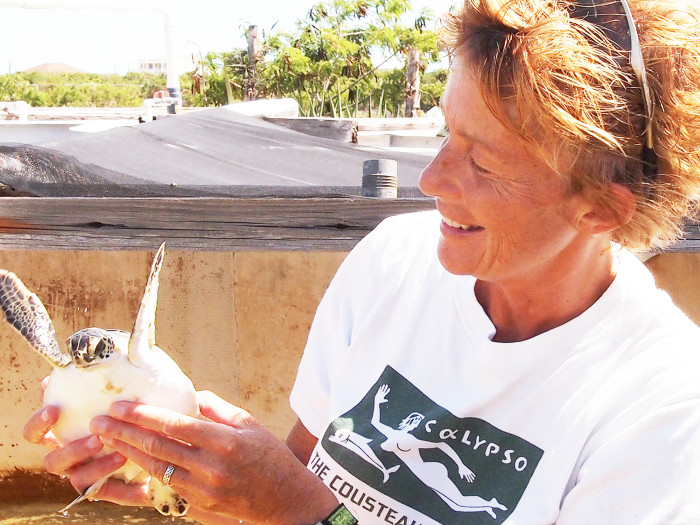
Cunningham with one of 7 sea turtles rehabilitated by Eiglys Trejo / Photo: Eiglys Trejo
WM: You visit some remarkable places on your journey to understand the state of the oceans. Can you tell us a little bit about how your journey came together?
Liz Cunningham: Ocean Country evolved out of deep curiosity about my longing for the ocean and a sense that something was terribly amiss, because of how much we were damaging the life of the seas. I began by re-visiting a place where I’d connected to the ocean very intensely—the Turks and Caicos Islands. I wrote about conservation efforts there and near my home on the California coast. For Ocean Country, I wanted to give the reader a sense of the whole earth as “ocean country,” because all life needs water to flourish and 97 percent of that water is in the ocean. I chose West Papua and Sulawesi because they were very remote and biodiverse – West Papua is the world’s epicenter of marine biodiversity. I chose the Mediterranean because of its proximity to highly populated, industrial areas.
WM: Early on in the book, you describe a terrible accident that almost claimed your life. How do you manage somewhat debilitating health challenges while also pursuing what you are passionate about?
Liz: I need to tell myself often, “Stay positive, and if an issue comes up, deal with it then.” Funnily enough, it’s as important to do that when I’m home in front of a computer as it is being on a boat in a remote location!
Since the accident I’ve struggled with back pain and Hashimoto’s disease, an autoimmune disease. I have to pace myself when traveling, take more care to stay hydrated and rest more than others. There were days when I was in Sulawesi that I was asleep by 7 PM. If I adapted, I could manage OK and “good enough” was “great.”
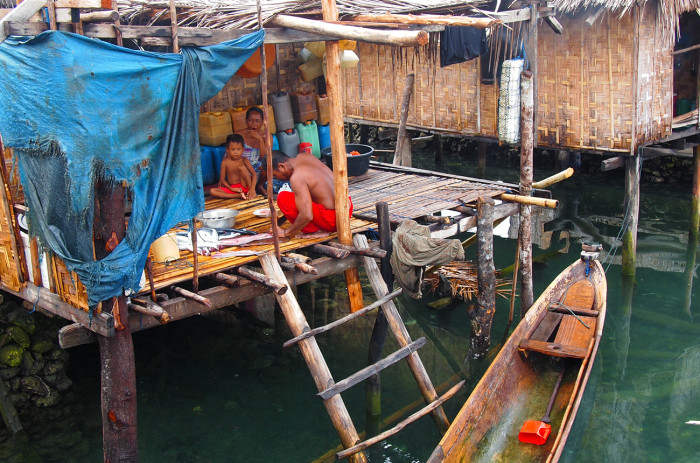
Cunningham researched the culture of the Bajau sea nomads in Sulawesi / Photo: Liz Cunningham
WM: There’s a point early on in the book where you talk about pragmatism and pessimism in the face of problems like climate change and ocean conservation. Can you tell us about the dangers of knee-jerk pessimism?
Liz: The danger of knee-jerk pessimism is that we give up hope and that becomes a self-fulfilling prophecy. One of the most insidious wolves in sheep’s clothing is pessimism disguised as pragmatism. “Be pragmatic,” the wolf says, “Things are not going to change.”
The assumption is human beings are predominantly selfish and destruction is necessary for survival. But every major social movement—whether to abolish slavery or achieve equal rights for women—has involved great individual generosity and changed the structure of our economy, the so-called “things that are not going to change.”
The movement to turn the tide on the destruction of the earth and make our civilization more just is growing—it’s the largest social movement in history. Will it succeed? We don’t know. But we do know that every time one of us clocks in, there’s more hope.
WM: One of the things I took from this book is the importance of recognizing beauty in the world. This opens us up, of course, to a lot of grief as well. Can you tell our readers a bit more about your experience of the relationship of beauty and grief?
Liz: Writing Ocean Country definitely transformed what I thought “beauty” is. For me it’s a certain synchrony with oneself and the world, a certain chord of aliveness. It is not the absence of pain—grief can be a part of it.
Encountering [Buddhist scholar and environmental activist] Joanna Macy’s work, especially her book Active Hope, changed how I related to my grief about what is happening to the seas and our earth. I have learned that if I listen to my grief—pay close attention to it—it is a wellspring of growth and insight.
Through that deep listening my strong desire to take steps to save the natural world surfaced. That was a very big deal.

Cunningham photographing a school of fusiliers in West Papua / Photo: Linda Johnston
WM: How has that changed your actions?
Liz: It’s a fragile tether between that experience of beauty and grief and answering the question, “What actions can I take?” That tether between experience and action is very important. It nourishes the fortitude of our soul.
I serve on the board of Outward Bound Center for Peacebuilding. My colleagues there have shown me all the more how our mindset can short-circuit our desire to do something positive or put into play actions that can have an important influence.
I am less hesitant to take action now. I refuse to talk myself out of it with dismissive thoughts like, “you won’t make a difference.”
WM: What have some of the changes been in terms of your mindset?
Liz: I see the value of action now more. With peacebuilding, you can ask, “In a world of rampant terror and multi-million-dollar arms industries, what difference could peacebuilding make?” The answer is, “Many people have already got started with this. The more peacebuilding efforts, the more peaceful and less violent the world will be.”
A similar adaptable, engaged hope applies to the state of our ocean and climate change. There is so much that we can do: the more sustainable our fisheries, the more marine protected areas we have, the less plastic we dump in our seas, the more we lower our carbon imprint, the better the state of the seas will be.
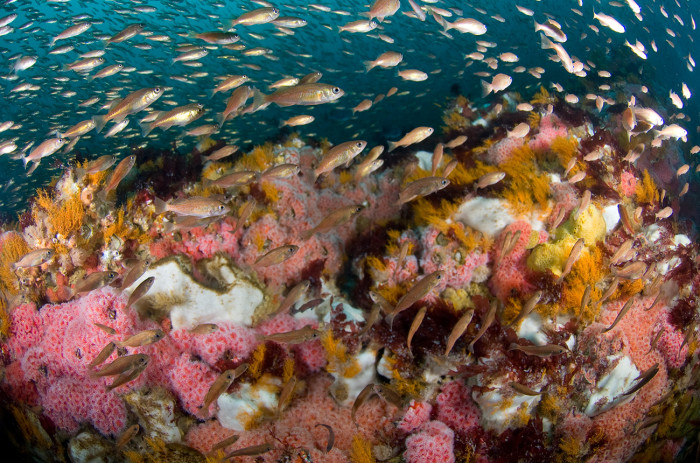
Sea life in the Cordell Bank National Marine Sanctuary thrives because it is in a marine protected area / image courtesy of the Cordell Bank National Marine Sanctuary
WM: You share the story of a Catalonian sandeel fishery that is co-managed by fishermen in a remarkably effective way. One of the lead fisherman, Luís Trias Martín, told you “In the past, if you caught fewer fish, you were a loser. Now it’s not just one person who wins; everyone wins. We catch less, we share, and we are all winners.” How can this idea be extrapolated to help in the greater effort to stop climate change?
Liz: A “livable future” will be a parallel process, “We consume less resources, we share them more, and because we are preserving a healthy environment, we will all win from this.” This kind of common sense is already registering at huge companies like Unilever—they are revamping their supply chains to be more sustainable. Luís and the other fisherman saw that if they wanted to keep fishing, they needed to change to a different model.
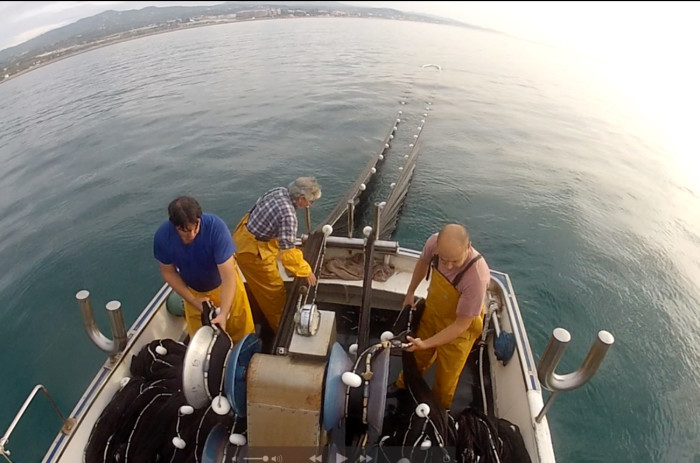
The artisanal sandeel fishery in Catalonia, Spain / photo: Liz Cunningham
WM: At the end of Ocean Country, you write “If I could sing one thing, just one, it’d be this: find someone or something to save. Be specific. Now’s the time.” Do you have any wisdom for readers on how to battle that paralysis and start taking action? How do we start?
Liz: For me that path begins with love, a sense of care. I have a deep love for the ocean. So putting that love to work helping to make the world a better place, that’s the “sweet spot” where I feel I’ll contribute most.
For others it might be working with children or the elderly or marine mammals. Even volunteering few hours a month can make a huge difference. The Marine Mammal Center in Sausalito, California has over 1,000 volunteers. For me, love is the great inertia breaker, the wiser part of our souls that yanks us out of paralysis and into the field of action and compassion.
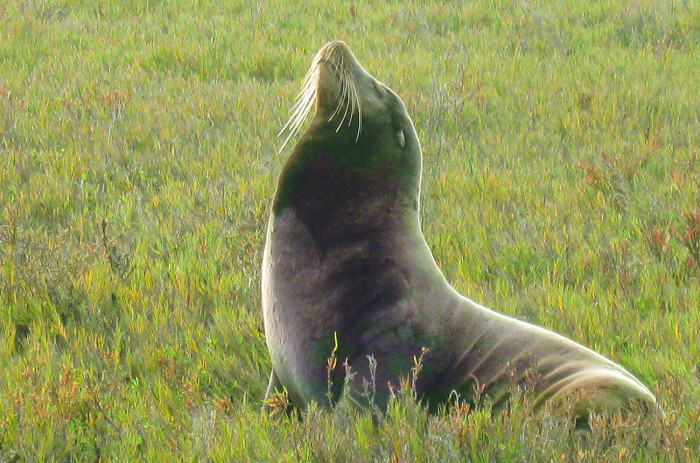
A stranded sea lion, nicknamed “Saps” was rescued by volunteers and successfully released into the Pacific the next day / photo: Charlie Costello
Liz Cunningham is the author of Ocean Country: One Woman’s Voyage from Peril to Hope in Her Quest to Save the Seas and Talking Politics: Choosing the President in the Television Age. Her writing has also been published by Alternet.org, Earth Island Journal, Times of the Islands, The Marin Poetry Center Anthology, The San Francisco Chronicle, and other publications. Her website is: www.lizcunningham.net.
Twenty-one percent of royalties from her new book will be donated to the New England Aquarium’s Marine Conservation Action Fund. That percentage was chosen because it’s the percentage of oxygen in each breath we take. Over half of that oxygen comes from plants and algae in the ocean. The New England Aquarium’s Marine Conservation Action Fund (MCAF) aims to protect and promote ocean biodiversity through funding of small-scale, time-sensitive, community-based programs.


December 13th, 2015 at 10:22 pm
Great article Kate about a truly inspiring pioneer of ocean conservation. Thanks Liz Cunningham for your dedication and passion. Respect.